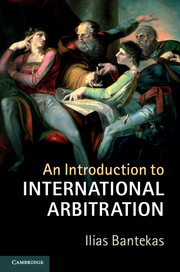Book contents
- Frontmatter
- Epigraph
- Contents
- Preface
- Table of cases
- Table of treaties
- Table of domestic laws
- Institutional Rules and Soft Law
- List of abbreviations
- 1 An introduction to international arbitration
- 2 The laws and rules applicable to arbitration
- 3 The agreement to arbitrate
- 4 The arbitral tribunal
- 5 Arbitration and the courts
- 6 The conduct of arbitral proceedings
- 7 Arbitral awards and challenges against awards
- 8 Recognition and enforcement of arbitral awards
- 9 Consumer and online arbitration
- 10 Investment arbitration
- Index
7 - Arbitral awards and challenges against awards
Published online by Cambridge University Press: 05 August 2015
- Frontmatter
- Epigraph
- Contents
- Preface
- Table of cases
- Table of treaties
- Table of domestic laws
- Institutional Rules and Soft Law
- List of abbreviations
- 1 An introduction to international arbitration
- 2 The laws and rules applicable to arbitration
- 3 The agreement to arbitrate
- 4 The arbitral tribunal
- 5 Arbitration and the courts
- 6 The conduct of arbitral proceedings
- 7 Arbitral awards and challenges against awards
- 8 Recognition and enforcement of arbitral awards
- 9 Consumer and online arbitration
- 10 Investment arbitration
- Index
Summary
Introduction
This chapter aims to introduce the reader to the variety of arbitral awards and the reasons for choosing one form over another. It will go on to demonstrate the differences between an order and an award and the consequences arising from this distinction. Moreover, an analysis of the binding nature of awards and their subsequent production of res judicata will help the reader understand under what circumstances a party may be estopped from further pursuing claims and issues already decided by an existing arbitral award. In addition, the chapter will discuss the preconditions for valid awards, as well as the remedies which the parties can seek from the tribunal. These range from simple monetary compensation to restitution and gap-filling in the parties’ contract. Once we have explained the nature of arbitral awards we shall go on to explore the possible challenges against them. We identify three grounds for challenges, namely jurisdictional, procedural and challenges on points of law. A large part of this chapter is predicated on an analysis of pertinent domestic laws and practice and although an effort is made to discern general principles, the reader should view references to domestic law as merely an illustration of practice and not as hard law that applies uniformly throughout the world.
Legal nature of awards and res judicata
7.2.1 The legal nature of awards
The purpose of arbitration is to resolve disputes by arriving at an award that is in conformity with the law of the seat. These two qualities of the award, namely its dispositive dimension and legality (or validity), can be guaranteed by the tribunal because they lie within its power. This suggests that there are qualities or dimensions to an award which lie beyond the authority of arbitrators. By way of illustration, although arbitrators must ‘make every effort to ensure that the award is enforceable’ they cannot foresee the peculiarities (especially the minute ones) of every legal system and the requirements they impose for the enforcement of foreign awards. It is, of course, a wholly different matter if the parties have notified the tribunal as to where they intend to seek enforcement of the award and the tribunal subsequently fails to address the requirements of the enforcement state even though it could easily have done so.
- Type
- Chapter
- Information
- An Introduction to International Arbitration , pp. 185 - 217Publisher: Cambridge University PressPrint publication year: 2015



